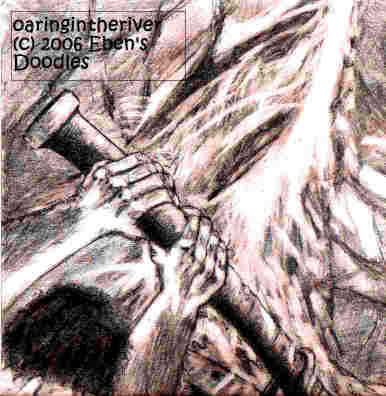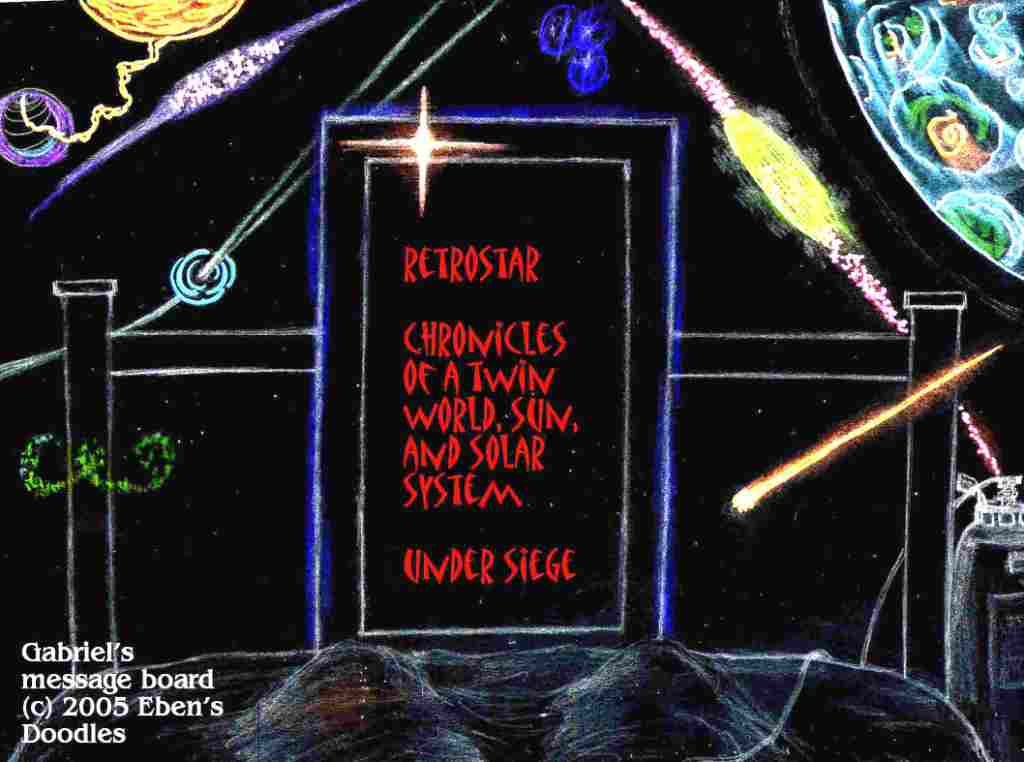

Before the Lakota recorders, Jason the captain of the Argo, who led the Argonauts' expedition to regain the Golden Fleece, foresaw this apparition heading for Earth:


R E T R O S T A R
D I R E C T O R Y
A N D
L I N K I N G
P A G E

RETROSTAR, OR, THE CIRCULAR WEB:
Chronicles of a Twin Earth, Sun, and Solar System Under Siege
Dedicated to Gabriel Tall Chief who first blew the horn and to M.G.Y. (Marty Gantry Yeager aboard RMS TITANIC) who couldn't hear it...

WELCOME TO THE TWIN EARTH(S)!



THE TEN STONES OF FIRE--Ezekiel 28: 13-14:
"Thou has been in Eden the garden of God; every precious stone was thy covering, the Sardius, Topaz, and the Diamond, the Beryl, the Onyx, and the Jasper, the Sapphire, the Emerald, and the Carbuncle, and Gold...thou art the anointed cherub that covereth; and I have set thee so: thou wast on the holy mountain of God; thou has walked up and down in the midst of the stones of fire. Note: Each fiery stone of heaven is corrupted by the fallen cherub, Lucifer, the "Light-Bringer," and it acquires a different character and a guiding deadly creature of evil genius hidden within it.

WELCOME TO VOLUME I, FATAL CONVERGENCE! This is the point of entry for the First Alien Entity!
The great, state of the art, "unsinkable" Ship of the World has set sail on its maiden voyage with its cargo of fools, both fabulously rich and contemptibly poor, educated and uneducated, moral and immoral, beautiful and ugly, tall and short, nice tempered and ill-tempered, with nice teeth or with bad teeth, brown eyes and blue, or black and hazel--a complete human spectrum if there ever was one assembled together on one huge vessel. Certainly, there was more than room enough on this one. As tall as a New York skyscraper of that day, she was a city afloat, all the social classes present and working more or less amicably together to get to their destination, the New World's portal of New York, where they would part and, except for the super rich, never see each other again. Yet as sometimes happens with management at the highest levels, arrogance sets in, and just a tinge will do, impairing judgment and producing flawed decisions that, in the Titanic's case, proved just as fatal as it once did for the once mighty Titans who committed hubris and lost Atlantis.
Sailing full steam ahead to New York and, ignoring every warning, straight into an ice field...

Aboard the doomed liner a little girl in First Class lay in bed, troubled with a dream about people, some she could recognize, splashing about in nasty cold, icy water, screaming, while her nanny sat beside her reading a naughty French novel of romance in a Gothic castle.

Kiowa sages recorded the Great Canoe's sinking on their cowhide calendar.

Ero the Cybernaut also gazes into the devouring mouth of the Red Star:
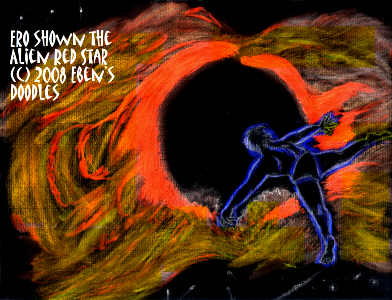
In its path, planets and stars and entire galaxies are consumed by the red-flaming star:

CHRONICLE ONE, PART I, VOLUME I, FATAL CONVERGENCE, RETROSTAR
Dr. Pikkard, Dutch Genius/Retrostar's Cosmic War Challenger # 1
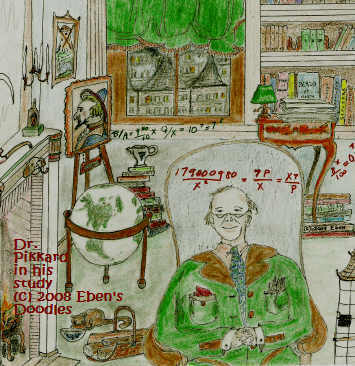
At certain points in the war, Dr. Pikkard's greatest creation, the intrepid e-butterfly named Wally, is the lone combatant:

Our RetroStar Chroniclers:

Gabriel Tall Chief, confined to bed in a children's hospice the remaining days of his CP-shortened life, shone like a pure blue star of heaven (which is awarded to those who fall in battle) in a red-star-dominated world. Which was more powerful? Only time and events will tell:


Gabriel's disciple and dream-weaver and dream-rider, Horace Brave Scout, who gathered the "fragments" of the chronicles that remained after Gabriel died and made a great leap for mankind.


Horace Brave Scout playing "Amazing Grace."


The Series of the Twin Earths is available on disk or can be electronically transmitted. The series consists of: RETRO STAR, Vol. 1, Fatal Convergence, Vol. 2, Cloud and Avalanche, Vol. 3. Battles of the DUBESOR, Vol. 4, Lost Chronicles; Part Two, Unchronicles, Vol. 5, Natal Convergence, Vol. 6, Beyond the Rapture, Vol. 7. Final Wars...Convergence at Orion

A "Letter to Agent, Outlines, and Overview and Marketing Strategy" of the Series":
Agent Letter, Outlines, Strategy
A Last Word Count in ANNO STELLAE 1997: 1,400,000

Outlines for VOLUME I, RETROSTAR:
CHRONICLES 1-24--WHAT'S IN THEM?
CHRONICLE ONE--WHAT'S IN IT?
CHRONICLES TWO TO SIX--WHAT'S IN THEM?
CHRONICLES SEVEN TO NINE--WHAT'S IN THEM?
CHRONICLES TEN TO TWELVE--WHAT'S IN THEM?
CHRONICLES EIGHTEEN TO NINETEEN--WHAT'S IN THEM?
CHRONICLES TWENTY TO TWENTY-THREE--WHAT'S IN THEM?
CHRONICLE TWENTY-FOUR--WHAT'S IN IT?

OUTLINES, CHRONICLES ONE TO FORTY-FIVE
OUTLINES, CHRONICLES FIFTY-EIGHT TO SIXTY TWO

Main Game Players (Earth II):
1. Ever wondered why the Titanic was named that? It wasn't the luxury liner's colossal size alone, her namesake was The Titans (Atlanteans) who lost Atlantis, on both Earths; then tried repeatedly to re-assert their rule over Earth II; they are a superhuman species that has turned vampire and lives almost indefinitely. Their major downfall, besides arrogance that led to hubris, was constant in-fighting and power struggles as this claimant and that claimant for the throne duked it out, with no gloves and no holds barred.
2. The Ten Stones of Fire (Starlike, Jeweline, Super-intelligent, Alien Entities), each performing as OP, or, Opposing Player, with the aim of conquering and destroying the Earths, I and II, and their respective universes.
3. Dr. Pikkard's Computer Wargame, represented by Wally, an electronically-created, free-roaming butterly who fights for humanity's survival against the Alien(s)
4. Human "Alphabetic" or A-Z Champions, also a subgroup called DUBESOR, or the Rosebud Champions
5. Yeshua, the A and Z, the Alpha and Omega, and the Aleph and Tau (also known as FC, the so-called "Forbidden Category")

EVEN BEFORE THE TITANIC'S SPECTACULAR MAIDEN VOYAGE DIVE TWO AND A HALF MILES DOWN IN THE NORTH ATLANTIC TO THE EDGE OF THE ABYSS, RECORDED IN CHRONICLE ONE, SOME CLUES ARE GIVEN US. FOR INSTANCE: ON BOTH EARTH I AND EARTH II A CERTAIN CHOICE OF A YOUNG RUSSIAN ARISTOCRAT'S FIANCE (UPPER CLASS, KREMLIN-BORN AND BRED DAUGHTER OF A COURT PHYSICIAN, KNOWN LATER AS ONLY THE "OVERLY POSSESSIVE" WIFE OF THE NOBEL PRIZE-WINNER COUNT LEO TOLSTOY) PREPARED THE WAY OF THE ALIEN ENTITY ON EARTH II AND THE DRAGON ON EARTH I: FOR THIS CHECK OUT SCENARIO I. THEN RETURN FOR SCENARIO II, WHICH REVEALS THE GREAT RECORDER HIMSELF, CHRONICLER GABRIEL TALL CHIEF. FINALLY, SCENARIO III, WHERE A KREMLIN STARETZ (PROPHET) REVEALS YEARS BEFOREHAND WHAT IS GOING TO HAPPEN IN THE ILL-STARRED 20TH CENTURY OF BOTH EARTHS, WHEN SOMETHING WORSE THAN THE H5N 1 STRAIN OF THE BIRD FLU VIRUS IS INFECTING THE TWINS, SO THAT THEIR INTERTWINED FATES ARE ALMOST IMPOSSIBLE TO SEPARATE FROM EACH OTHER.

RETROSTAR CHRONICLES:
RETROSTAR CHRONICLES DIRECTORY

Earth I's supercontinent, which may have contained all the continents which presently exist:

Earth II's lost first civilization, Mukalia, and its continent:

Earth II's Mother Continent, Atlantis II, after the Re-Location of the Planet:
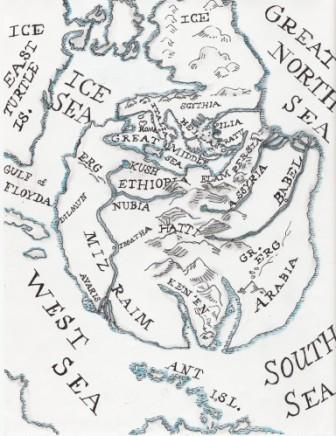


UNCHRONICLE OF THE HEAVENLY RUNEBOOK, Vol. IV, Retrostar
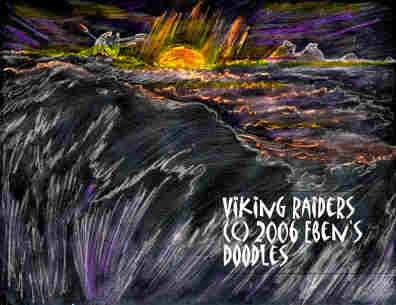
Like the Muslims of the 7th Century, they seemed unstoppable on the seas, they were so ferocious and regarded no man's laws but their own. Dane-land was their wolfish mother, a breeder for the most powerful and rapacious of the whole race. Small, but ideal for sheltering and hiding their fleets, the northern land across from Britannica birthed tens of thousands of Viking Danes.
Becca the Red was one of them, bear-shirted, with a lion's mane, and barely turned twenty, but already an accomplished warrior and mariner, two things you had to be to be taken aboard a warship outbound for battle and prey and booty. Dane-land was a small place, without great forests and plains or much farmland, and far too crowded of late, so many cast eyes westerly and sought their fortunes and livings elsewhere, wherever defenses were weak and not too wary but the people rich, and Britannica was just what they were looking for.
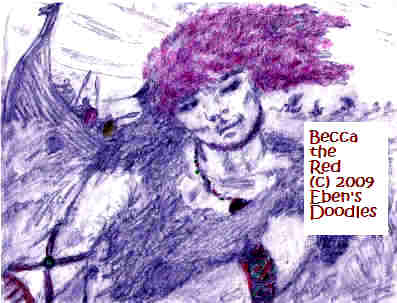
Coming episode:
Most people acknowledged, that Becca's grandfather was the most wise of men. Even wise men came to talk to him, seeking counsel in matters small and great, extending to the king at Hedeby and the expeditions of war fleets for raiding and plunder that sallied forth from there. It was no wonder that some of the more thoughtful younger men visited him too. Becca did not have to be told by other men how wise his grandfather was. He valued his grandfather greatly, and sought his side as often as he could spare from hunting, fighting, gaming, building on the chief's fleet of dragonships, and other pursuits.
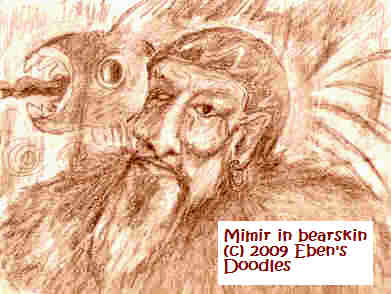

Eight year old Honorius Urbanus and his distinguished father made a special trip all the way from Glevum in southwestern Britannica to Roma, the ruling capital of the world. It did not start so auspiciously, however, after they crossed the water and traveled through barbarian- ravaged Gaul. Even northern Italia was just as broken up.
Rufus Urbanus was upset, for the sake of his Honorius. Was this to be the memory of it bequeathed by a father to his son? If so, it was a bad journey! Rufus thought, feeling he should have gone alone and faced such things rather than expose his young son to them. Yet further on they found the real borders of the shrunken Western Empire still held firm, for the time being anyway. Beyond was Roman civilization as it had always been--glorious and proud and well-ordered--and they proceeded south on the Roman road directly to the Queen City itself. There young Honorius would see the sights that would forever blaze in his memory: Roma in her full glory and splendor, a city beyond description, the like of which the world had never seen before and would never see again after the barbarians broke through the borders and had their way with her.
Chronicle of the Phoenix of Britannica, Out from the Ashes, Vol. IV, Retrostar
Unchronicle of the Road to Roma, Vol. IV, Retrostar

Waste of Blood, and waste of Tears,
Waste of Youth's most precious years,
Waste of ways the Saints have trod,
Waste of glory, waste of God--War"--Woodbine Willie
Was it really Helen the wife of King Agamemnon, particularly her lovely face that launched a thousand war ships of the Greeks against Troy? Or was it some dreary political or economic issue rather than illicit romance between the handsome, daring Paris and another man's beautiful wife? Judgment about causes should wait for years after the dust and smoke settles or even till when the bronze of war heroes' statues is tarnished. War is not about the officially announced reasons--those are only pretexts got up and inflamed to hysterial proportions to justify brutal aggressions and cover up the real motivations and agendas of the instigators. Where power struggles between hotly competing royal dynasties of major European empires and nations are concerned, antagonisms are rooted so deep and are so tangled, all going back hundreds of years and even further, the incessant, subterranean bubbling of those ancient conflicts and rivalries in the European heartland will always ignite strife and ultimately warfare. That heartland is a perennial breeding ground for monsters of inhumanity and every atrocity of which they are capable, and it is that very heartland that produced what is called The Great War.
This war was, indeed, great in scope and consequence. It would topple the crowned heads of the monarchies of most of the European powers. As prophesied by a bearded, robed, iconic staretz in the Kremlin, this war broke out that would exhaust Europe, killing off nearly a whole generation in all the countries that fought it, then resume again some years later to devastate the entire continent with tens of millions more slain, both military and civilians.
June 28, 1914, two years after the Titanic converged with what was thought to be an iceberg and sank in the frigid Northern Atlantic waters off the island of Newfoundland, the heir to the imperial Austrian throne, Archduke Franz Ferdinand with his wife Sophie, paid a state visit to the South Slavs. What was so special about this? State visits by the Archduke were a matter of routine, for he was a world traveller. Where hadn't he visited? So a visit to the Balkans was not special, except that it went wrong, terribly wrong.
An expert huntsman (insofar as it required expertise to shoot game that was driven toward him by teams of men encircling the animals), whose palace walls back in Vienna were covered top to bottom with upwards of 200,000 antlers and mounted heads of every kind of game animal, the Archduke was in turn hunted and his carriage bombed by Serbian nationalists in Croatia.
Shock waves struck the hearts of the many peoples of Europe after the news flew rapidly by telegraph to every capital. Ultimatums were issued from Vienna to Serbia, and when they were not met by the recalcitrant Serbs, war was declared on Serbia by the Austro-Hungarian Empire, with Imperial Germany following suit as an ally.
The banners of all the newspapers blazed with war declarations of country after country. Orders went out to the male citizenry of France, Britain, Germany, and Austria, and other countries--mass mobilizations were begun. Millions of fighting quality age kissed their wives and children and left their homes and jobs and trekked to the army centers and depots for induction, training, outfitting, and weaponry.
Armies already in the field were rushed by train and on foot to positions along the borders between France and Germany. Factories were rapidly converted to supplying the many war machines. All available resources were committed to the war effort. Propaganda offices worked overtime, churning out war posters that portrayed the respective antagonists in the worst possible light. Spies fanned out by the thousands across Europe, slipping discreet bribes to officials in sensitive positions in war departments, using pretty women to lure army officers to divulge information, infiltrating wherever they could into the enemy countries to spot weaknesses or major movements of troops and material.
Army battalions paraded in the streets of a thousand cities, as men marched off to the Front with bands blaring and crowds madly waving handkerchiefs and flags and cheering them along.
All Europe (except neutralist Switzerland, Sweden, and a few other small countries who had nothing to gain from fighting with lions) was caught up in a frenzy of high expectation, terror, anxiety, anger, and vengence. This time the anciently seething wrongs which Europe never could forgive and forget would be righted, the enemy would be crushed and rendered powerless forever. Yet Europe was thought to be so civilized and enlightened by science and the Age of Reason, this time it would be different: unlike in the past, vengeance would not ignite another cycle of strife and warfare like in the past. Modern 20th Century Civilization with its enlightenment of the mind and spirit and nature of man would surely prevail over savagery, the primitive brute creature of base instincts that lingered as a vestigial legacy of ancestral Neanderthals in man's pedigree. Refined by education and the arts, modern man stood poised like an Olympic athlete in white running togs on the cusp of a new era of mankind's upward progress and development, entering a brave new world where there would never be need of war again, for victory would kiss the dove of peace and never let it fly away. A thousand years of peace would prevail over the entire earth, and science and industry would transform it into a paradise where the parliament of man, spoken of by Alfred Tennyson, would sit and levy only just decrees that would treat everyone equally.
This was, from the onset, to be the war to end all war: most everyone (except the grim, dark eyed staretz in the Kremlin) bought this wonderful, shining idea, and it added a burning fervor to the war not seen in all the prior conflicts on the Continent since the Thirty Years War and other wars of religion in the 1700s. The sirens of war, looking either their most seductive or just like the girl next door cried out to an entire generation of young men: "Fight this war, my darling, and win everlasting peace and happiness for yourself and your nation! Do your duty by the Fatherland and the blood of your forefathers! Defend the sacred hearth of the Home and your mother and sister's virtue against the raping barbarian! Crush our enemies, strike him down to the dust once and for all, trample him, etc., and your nation will heap on you imperishable honor and gratitude!"
Flags, flags, flags! Bands! Martial music and marching musicians with little boys tramping alongside with wooden rifles and stick bayonets! Speeches by government leaders before tens of thousands in public squares and grand boulevards. Parades. Cheering masses. Madness...as the dogs of Europe barked and howled from Edinburgh to Moscow.
There had been countless continental wars before, sometimes of great magnitude, especially in the times of Napoleon, so people thought it would be much the same thing, but most wars were not that serious. Surely, this Europe was so civilized that this time time peace would be instituted and maintained indefinitely. After some bloodletting in a battle or two, the peace envoys would confer at some palace or other in France or Britain or Holland, a deal would be struck, and life would revert to the old paths and people could go on as before. But a new player entered the geopolitics in 1914, unknown and uninvited by the Great Powers, which changed everything and opened the abyss itself.
An evil star flew an erratic, zig zag path down to the Somme in France and was now shedding its malevolent rays upon the whole Western Front.
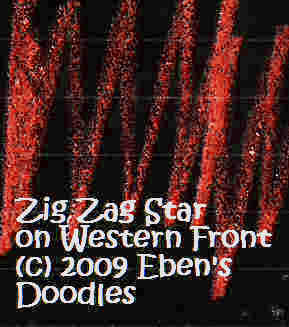
This "star" was a Carnelian, or Sardius, the chief of the ten fiery stones or heavenly jewels that Lucifer, the Covering Cherub, had corrupted after he gazed upon the glory of God and began coveting it for himself alone.
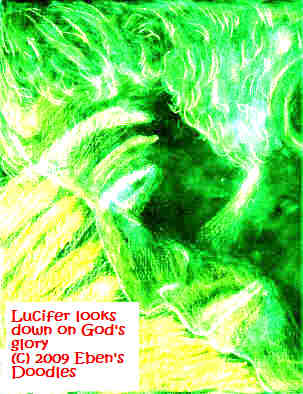
Everyone caught in the fiery red star's beams fought like a beast and was slaughtered like a sheep.
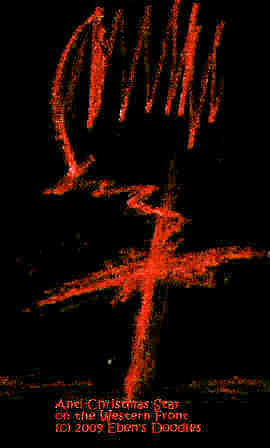
Taking leave from the post of vicar at St. Pauls in Worcester in the Midlands, the Rev. Geoffrey Studdert Kennedy, the man already known as a treasure in a small package, carried as many travelling bags as he could to the train. They were stuffed with Woodbine cigarettes he had collected for months and paid for with his own money, saved from a bequest of 1500 pounds bequeathed him by a departed uncle-- a rather tightfisted gentleman while he still lived, though with a good heart who had had misgivings about money he could have given the fund-strapped Geoffrey while he was attending Trinity in Dublin for his degree. The uncle had reason to have misgivings for his holding back. The boy came from a large family where there wasn't a lot of money for his advancement, so that the entire family had to sacrifice in order to put this one son through Trinity.
Not stopping over at London Rev. Kennedy went directly to Portsmouth, staggering beneath loaded bags aboard ship to Calais. The crossing was routine enough, with no Zeppelins dropping bombs on them this time, but the choppy water and the rolling old trawler turned transport made him run for the rail a number of times. Then Calais was a mad house. Every kind of transport was taken by military troops or hordes of fleeing citizenry from the provinces affected by the war. Showing his papers, the Customs waved him and his bags through without inspection. But where was he to stay, and how was he to get to the Front? He must have asked a hundred different people before he found a way out of Calais.
After paying an exorbitant amount as a bribe to the station master, he wedged himself and his bags into an officer's berth in a troop transporting train and reached Rouen, stoutly declaring to Customs he was carrying Bibles and religious materials (which was not a blatant lie, since the bags did contain some Bibles and religious materials, and the cigarettes were for the troops' morale). Once he was free of the French authorities, he broke out the first case of cigarettes at the British canteen.
He was a smash hit from the start! The thin, poorly rolled, adulterated French cigarettes were clearly inferior to the British smokes based on prime Egyptian tobaccos, and expensive and hard to get too--and here they were being given free Brit cigarettes by the pack! Easily the most popular chaplain with his boyish looks and his generous way with cigarettes, he was being called "Woodbine Willie," and was talking to as many soldiers as he could before they departed to the Front, just to inject some hope and cheer into the men headed for the trenches. He could see the specter of fear, even stark terror shining in the eyes of the grinning young men--the older ones were resigned to a bullet in the vitals or, for the less lucky, an exploding Teutonic shell with their names on it, but not these smooth-cheeked youths, who looked like mere choir boys to the chaplain. For these he had come--he knew he could drive out that paralyzing fear with love of country and love of God, and everyone knew that the Huns imperilled not only all Christian civilization but their homes and families. He would remind these boys they were here in France defending their beloved British mothers, daughters, and sisters back home, whom the Huns would surely rape if they could break through the Western Front and invade the homeland. The tow-haired Huns and Teutons of Kaiser Wilhelm had already ravished Belgium and to Poland and Russia; they had to be stopped in France, or they would overwhelm the whole West with rapine and barbarism!
He might have stayed in the relative comfort of the ancient, civilized city of old Normandy renowed for its ties to Joan of Arc, the teenaged maiden savior of France, and let the troops come to him. Other clerics might have done that, rather than muddy their shoes and clerical robes in the muck of war. But after waving away a hundred or so of his countrymen, Woodbine Willie felt he was not doing all he could any more. He couldn't just sit in safety and comfort, a nice pension around the corner to park his gear and bathe and sleep, while the troops were off facing and battling the Kaiser's hordes, slogging through mud, mud, and more mud. No, he had to do more! He needed to go with them and experience what they were going through, he decided. He expressed this desire of his heart to a soldier at his table, in fact, since he had nothing to hide in coming to minister faith and hope to Britain's grand warriors.
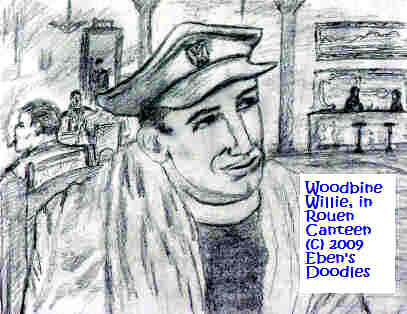
Lt. Colonel Blastwaite, commander of the newly arrived battalions, sitting at a near table overheard what Woodbine Willie was planning to do, and he tried to stop him. He called Rev. Kennedy over to his private table and offered him a chair.
Then he smiled his most winning way whenever he was dealing with a man of the cloth--since he hadn't always found them men of practical reason, such as military men had to be if they weren't absolute bloody incompetents and flunkeys.
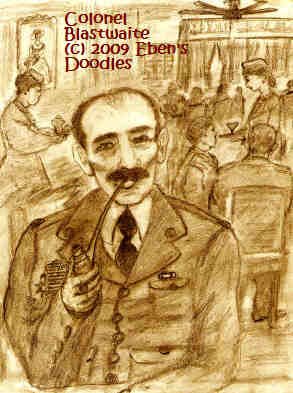
He took a few meditative puffs first on his long-stemmed pipe that he procured on one of the bloody and disastrous Afghanistan campaigns--the only good thing he got from any of them. Then he leveled with the chaplain, for he sensed this man, despite his patriotism, had not yet even imagined the least of the horrors of what war really was about. "But the troops love to see you here, Reverend, you are perfectly accessible to them as soon as they land, and here there won't be any problem with you getting hit with artillery or a sniper's bullet--which would be a perfect waste of such a jolly young chap as you! No, you are better off here, not at the Somme, which is bloody hell right now and not apt to improve any time soon."
"Are you saying, sir, you'd order me to stop here?"
"No, I am not saying that!" the colonel blustered. "You have your commission and orders drawn up at the War Office, I presume, and no doubt they don't stipulate your precise location of duty--which is generally left at your own discretion in these cases--but, as one gentleman to another, I have seen these wars often enough, and I am just trying to give you a more sensible plan of action, one that will preserve your life for the sake of the troops who need a little cheer-up!"
Woodbine Willie smiled. "Your sentiment is appreciated, but the Lord will preserve me, not the governors of this war. He alone is my refuge, my fortress, my high tower. I'm not afraid of what mere flesh and blood or bombs can do to me. When can I go forward to stand alongside our brave lads? I can have my bags and my gear ready in five minutes, sir, but please afford me ten at least, so I can settle up properly with Madame Leblanc, the proprietress and concierge at my pension. I don't want the French to think we British take advantage of our allies and hosts!"
Motorized columns along with horse-drawn lorries converted from street cabs and wagons were already rolling out from Rouen, carrying cheering, laughing, celebrating troops to the Front on the Somme, where a major offensive by the Germans was just then being launched. They could even hear the distant thunder of the Big Berthas, the Germans' most powerful, long range artillery.
The colonel shook his head over the vivacity and spirit of this young chaplain, which had communicated visibly to most of the army personnel in the crowded room, then send an aide to find a place for him in his own staff car--a new American vehicle shipped over for the British ally.
Arriving at the Front, Woodbine Willie went immediately to work and met with hundreds of men of the British Fourth Army in the dugouts and trenches, moving swiftly from position to position, greeting them, cheering them, handing out more Woodbines as fast as the hands reached for them. He was so glad he had come. He felt more alive at the Front than anywhere else in his entire life. It was so exhilarating and glorious, moving shoulder to shoulder with the brave young men right where they were laying their lives on the line in defense of the Crown and Christian civilization, Hearth and Home.
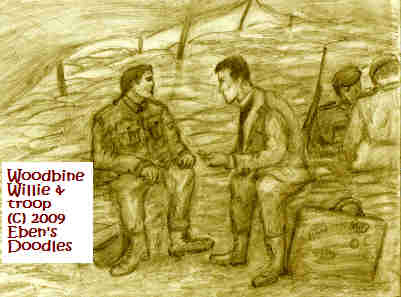
As he counselled and cheered up the troops as he knew how to do, it was the highest point of his life yet, he felt.
As he was moving toward another sand-bagged trench system nearest the German lines, incoming shells from Big Berthas reached the forward position before he could. He found himself wandering about dazedly in the next minutes, his ears ringing, as the ground eventually settled back, the air cleared, and he could see again where he was. But everything was changed, so utterly the terrain looked nothing like what it had been just a short time before. He had been walking through some wizened apple trees of an old orchard that still had apples clinging to unpicked branches, and now the orchard was gone, except for one shattered tree behind him. The farmhouse, requisitioned for the HQ of the frontline commander, Lt. Col. Blastwaite, was also blown away--not a trace remaining! Everywhere, the earth lay in smoking heaps, with water filled craters between. He made his way slowly through the torn up earth and tree roots, trying to find his way back to where he had been, but then heard moaning and wheezing sounds. He went to investigate, and found a soldier lying on his back on the inner lip of a bomb crater. He was moving his arms in a feeble sort of way, flopping them about limp-wristedly, and appeared barely conscious or alive.
Kneeling down by him, he found the soldier was missing his legs from the thigh down. He was ashen colored in his face, and it was certain to Woodbine Willie the young man had only a few more moments of life, if that.
"What is your name, son?" he stammered, as he pressed a cross against his forehead. The young man blinked and answered, and Woodbine Willie recognized him by his voice. Charles Harnsworth, from Tewksbury. He grew up just a few steps from the old Norman cathedral and used to play marbles with his chums on its steps and even in the vestibule until the vicar caught wind of it and chased them off! He had met this very fellow at the canteen in Rouen, and had a jolly conversation boosting his spirits, as unlike his buddies around him he had seemed particularly down at the time, confessing to him that he greatly feared imminent death--what with his fiance waiting for him back home and all.
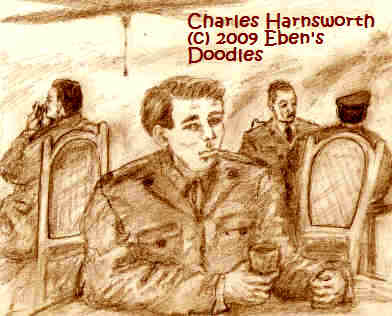
Woodbine Willie received the man's mumbled, halting Catholic confession of sin (for the young men of the Fourth were about equally Anglican and Roman Catholic, so in lieu of a priest he was instructed to care for both), was entrusted with a few words to be delivered to his mother and his fiance, and as he was doing that he choked up blood on Woodbine Willie's hand. The death rattle began, and it was brief, mercifully for the horrified chaplain.
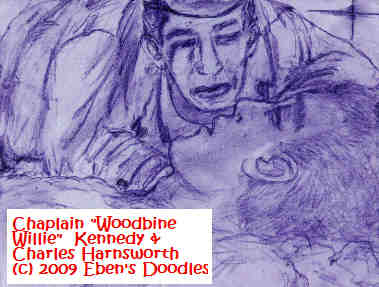
From his ministry kit in his pocket, Woodbine Willie brought out after fumbling with the snaps, a black cloth with a white and red cross embroidered on it beneath a British crown and covered the young man's face. There was nothing more he could do, so he made the sign of the Cross over him, prayed for his soul's safe journey to heaven, and then staggered away, trying to find his way back.
Woodbine Willie hardly knew where he was, if he was going forward or backwards, toward the Germans or his own countrymen. He just kept moving, crawling, falling, slogging through knee high mud and water, seeking human life, any human life in the midst of the cratered moonscape. He no longer cared whether German or Brit--the sight of Charles Harnsworth pumping out the last of his life blood on his very hands, that was enough to knock all his jingoism completely out of him. Was this war? He hadn't had any idea of it before being like this. It made no sense at all. It was sheer hell to him. He felt his faith was completely gone--blown out of him by the meaninglessness of it all. Where was decency and fair play? Where justice? Where love? Where was God anyway? Did God even exist? Was God dead, or indifferent, and Evil reigned over the whole earth instead? He could not stand it, and he pulled his cross off.
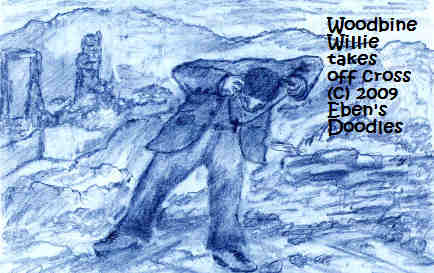
Without hesitating, he flung it as far as he could. He stood a moment shocked at his own act: he had thrown his cross away--and the last shred of his faith seemingly went with it. But he did not have the leisure to meditate on his act of brazen disbelief. Shells were still coming in, blasting the terrain directly ahead of him, then behind him. He felt that at any moment he might be blown to pieces, his body parts scattered over yards of torn-up ground.
All he could do was clamp his hands over his head and ears as the horrific explosions took place. Sometimes big clods of mud and earth dumped down on him. One time the shell came so close when it exploded that he felt the earth rise up under his feet, and he was pitched forward. When he realized he was alive and intact, he found he had fallen face into the mud.

As he lay there, he was blinded by a blazing image. The being in the midst of the powerful shining light was saying, "For this purpose I was born into this world, that you would bring my message of forgiveness and reconciliation to all men."
"No! If you were God, you'd stop this madness!" screamed Woodbine Willie into the mud, and the being of light vanished.
"Halt! I'll shoot! Who goes there?" a voice barked into the darkness.
He had no time to answer, as he was surrounded by dark forms, which spoke British and had to be his countrymen. He called out for help, and was then dragged from the muck and hauled to his feet.
He stood trying to tell his rescuers what had happened, but nothing coherent came out. He said some strange things--about poor bloody Charles, the Norman cathedral, the marble game, and quite left out that he was a vicar, a commissioned chaplain at the Front, and had got lost in no-man's land after finding poor Charles in such a bad way, virtually legsless.
What did a legless man matter? Hundreds of such happened every hour on the Front. Having seen many a man go daft like this before in the trenches, the sergeant ordered his men to take the noncombatant back to the HQ that had just been set up to replace the one the late Colonel Blastwaite had so briefly occupied. A fire had been started in the ancient ceramic-tiled stove of the farmhouse, a water pot rummaged out of the litter on the floor, some water strained through a cloth from a big puddle where a dead cat lay floating with a doll's head, enough to put on for tea, and a group with some cards was having a little amusement while they waited for a replacement for Blastwaite to show up--probably a rosy-cheeked lieutenant, with too much spit and polish this time, fresh out of officer's school, they figured, as colonels weren't considered as expendable as privates and corporals so no more would be hazarded at that luckless post.
"Hell's bells," one player remarked about his former commander. "You oughta seen what was left of the old colonel. Nothing! A fair decent bloke for an officer, he was! Let me share his private reserve of a fancy sherry, chilled in a bucket of ice he brought along from his hotel--which was jolly fine of him. Talked straight to me as though I were a colonel too! Shame it had to be him, but better than it be me, mates!" He laughed, and the others joined.
Stripped of his coat, scarf, and clerical shirt and collar, which had been strung over the stove on a length of barbed wire on two poles, Woodbine Willie sat miserably crouched in his skivvies on a crate, trying to get warm as the fire gained on the wood scraps and tree limbs stuffed into the stove.
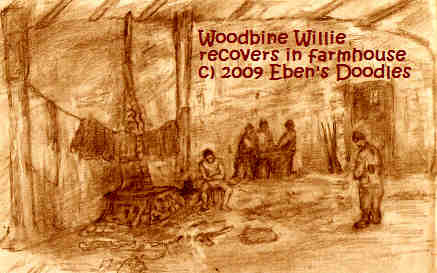
The serjeant who had found him floundering in mud and babbling like a madman tried to talk some sense into Woodbine Willie.
"Reverend, you must return to Rouen! This is no place for the likes of you. It's not safe here. You're a gentleman, a man of the cloth. You haven't been trained for it, what you see here. It has shook your mind a bit off the rails, that's all it is, but a day or two in Rouen will bring you back, and you'll be fine again, your old self. Treat yourself a nice, hot milk with whiskey and go straight to bed! That will fix you. We'll send you right back in the motorcar that fetches our new commander. I'm sure that will be fine with him--as he won't be going anywhere soon, not when the Huns crank those Big Berthas in our direction again! You just sit and watch your clothes dry, and I'll speak to the bloody lieutenant when he comes. It shouldn't be long now, as we sent word about Blastwaite in four hours ago. They said they'd send someone immediately! Of course, they had to finish their cigars and brandy first!"
Woodbine Willie cradled his head in his arms. How it ached! His whole body ached. But it wasn't from any injury, it was just from the crashing realization of what war really signified, which he couldn't possibly put into words. Despite the vision in the mud, his every cell and atom screamed speechlessly, "NO, NO, NO, NO!"
God, vision or no vision, couldn't get off so easily with a vision, if that was what it was, he thought. It was still No! to war, to the blowing up of all the bright-eyed, apple-cheeked Charley Harnsworths, and for nothing really! What good did it do to snuff out Harnsworth and tens of thousands of lads like him? Nobody even knew it back at HQ where Harnsworth was or what had happened to him. He had tried to tell the men, but they just laughed and joked.
"Well, well, isn't that so!" they humored him. "We'll not expect him then at reverie, will we chums? Hahaha!"
"And dip me out at mess one more cup of rotten whore's ----, righto?" quipped another, slapping his knee with a card.
Even the chaplain, unused to such filthy talk in clerical circles, recognized the term, the dirtiest he had ever heard as a boy from bad street boys.
Clothes or no clothes, Woodbine Willie wanted to rush out into the night. How could these men be so savage as to joke ghoulishly about the deaths of their countrymen like that, brave men who had given their very lives for the Empire and its cause? War had turned them into brute barbarians! That had to be the reason. Surely, if he could only get back to civilization and the code of honor among gentlemen, he would report them, and they would be hauled out and soundly disciplined as they should be.
But who would listen to him, if he ran out of there practically naked? They might think he had lost all his wits and clap him in the infirmary back at base camp. No, he realized he had to wait, and let his things dry out first, then try to make himself more presentable in the present appalling conditions.
The kindly serjeant brought him a cup he had found among the broken crockery in the cupboards he had filled from a bottle after blowing out the dust and mouse droppings in the cup.
Woodbine Willie looked up at the serjeant.
"Just a little kiss from the vine to strengthen your spirits, Reverend," the sergeant smiled. "Try it! It'll warm and settle your vitals. You will feel better soon."
Woodbine Willie took a sip, and realized somehow the serjeant had found a vintage year wine, maybe taken from a hidden cellar he had found and broken into. Centuries old French farmsteads that looked like nothing but peasants' hovels on the outside were renowned for gold socked away in foundations and hidden cellars stuffed with first-class cheeses, wines, sausages--which the owners left when they fled the area under attack, intending to return later to empty them out once the armies quit fighting and moved on. But sometimes the farmers were long delayed, as they couldn't get passes through the lines, and so the stocked cellars--if they could be found--fell to whomever was fortunate to find them first.
Slicing the excellent, smoked sausage, the friendly serjeant passed some on his big Swiss knife to the chaplain, along with a wedge of cheese. "Help yourself, sir, it may be some time before you get to a commissary and have a proper meal. It'll keep the life in you until then, that is."
Woodbine took the cheese and sausage, washed it down with the wonderful wine, and he did feel better after a few minutes--though not so merry he wanted to laugh at corpses of dead boys.
Gratefully, he felt a degree of warmth and ease circulate in his body and the terrible drumbeat of war withdrew from his shattered nerves, enough so that he nearly dozed off sitting, a pad in his hand where he had scribbled something that turned out to be his first war poem....
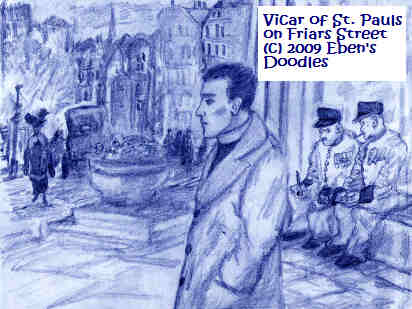
He was walking on Friar Street, Worcester, again--passing a couple veterans from past campaigns of Kitchener's British in the Sudan against the Mad Mahdi or maybe survivors of some bloody action against the revolting Boers in South Africa, and the sight of them made him wince and look away. He was trying to get away, after services, from the very thought of the war. But he couldn't! It was bad enough that he had to conduct farewell services to all the young servicemen departing from St. Pauls Parish. The mothers and sisters weeping, or looking very brave with trembling lips. The fathers grim, remembering their own ordeals in past wars perhaps, or the losses of their fathers and brothers. And the worst was thinking how they were all going off to do their duty, while he stayed on in cosy old Worcester, making him feel like such a bounder! What was he to do? He couldn't very well leave Worcester and join them, or could he? Yes, he could! Not as a combatant, as he was disqualified for service due to his spells of faintness and dizziness--something he had had from childhood. But surely they would take him for the chaplaincy! And he would ask leave from St. Pauls Church as soon as he rang up the bishop in the morning!
The door flew open with a bang and stomping boots wrenched Woodbine Willie from his dreams of Worcester.
The new commanding officer walked in, and stood as the card players quickly kicked back from the table and stood to attention.
But not quick enough for the new chief! "Serjeant!" the lieutenant barked. "What is the meaning of this? Why aren't you and your men at your duties, what is going on here? I caught you all playing cards! There is a war going on...a war! Are you here to play or to fight for the Empire? I will have you all demoted for this, if you don't mend your ways at once!"
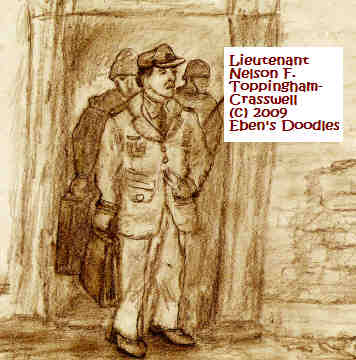
The new commander strode back and forth as he spoke, his voice rising, and then he paused, noticing Woodbine Willie for the first time.
"What in the world is wrong with that soldier there? Where is his uniform? He's practically...indecent! Serjeant, get him a uniform at once!"
The serjeant moved quickly, saluting, then explaining, "The Chaplain, sir! He had a little accident out in the wet--got his clothes a little muddy. So we've been dryin' them off for him, sir!"
Lt. Crasswell exploded. "This is my headquarters! I won't have it looking like Chinese laundry! Pull that line down! Sweep this floor! I want this place tidied up immediately. And get him attired properly. I have no use for chaplains here--send him on his way at once. We have a war to fight, not a ladies' tea social!"
Embarrassed and also angered, Woodbine Willie hastily pulled on his clothes with the serjeant's help, and even if they were a bit damp, they were warm enough and at least could be worn.
Meanwhile, the men had cleared the table, set it with a single chair, and the lieutenant was now seated, with his papers spread out as if he were conducting a major campaign.
Lt. Crasswell turned to the serjeant. "Pack him off to Rouen at once! I don't want him here, whoever he is. Time is of the essence if we're to beat the Huns! I've got a lot of work to do!"
"But sir, it requires a transport to move him! He's been badly shaken up and can't walk in his condition! He has no horse either."
"Well, then, use my staff car then! Just get him out of my sight, so I can have install some order here!"
Woodbine Willie was in no mood to argue with the shouting lieutenant. He was escorted out of the farmhouse by the searjeant and to the car, who tipped his hat and spoke privately to the chaplain.
"My apologies, Reverend, for this new comer. He is new at this game, and, just between you and me, sir, he don't know which end he sits on. Why, my old chums back serving at the main command post--you know, where all the colonels and the generals hobnob and dance with the high-class Parisian ladies at the club and drink too much-- sent word to me on the sly the Fourth Army has been destroyed. Destroyed! Now what's left of us will soon be pulled back to somewhere south. We're waiting for the order to come down any time now, so why fight?--we've been beat so bad there isn't a Fourth Army, so what's the use of sticking our necks out to get them shot off now? Will you be leaving the Front? I'd advise it, sir. It's nothing but a Bulgarian meatgrinder here--and we're the meat!"
"
"That's all right, serjeant," Woodbine Willie said. "I have to just think about it before I decide what to do next." The serjeant nodded, saluted, then shut the door, and the car moved off down the farmstead road.
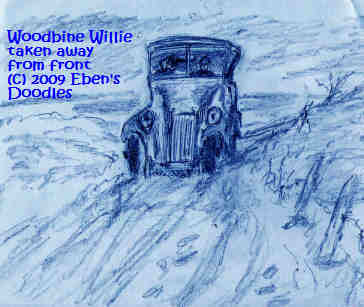
The driver was a lance corporal, and very talkative, though Woodbine Willie would have preferred silence.
"I'm Terrence Blassinggame Codd, at your service, sir, but you can call me just Codd if you like. And you're the famed army chaplain, Woodbine Willie, I presume?"
"Oh, so what if I am!"
"Well, I remember seeing you back at the Canteen, and you gave me two whole packs of Woodbines and we talking for the longest time! Jolly nice of you, Reverend! We all think you are a great fellow, for being so generous to us."
Woodbine Willie did not reply. Oddly, he didn't remember Codd, and he knew he never forgot a face. But the corporal rattled on, sharing all his thoughts the moment they flitted through his skull.
"You may think this is rather queer, sir, how this here is a staff car without officer's flags and insignia. But the Germans got wind of us and sent snipers wearing the uniforms of captured the uniforms of captured Brits and crossed the lines, and they were picking off the officers in their cars, one after the other. It was a turkey shoot! So I've removed the flags on the hood, and Crasswell approved, after he heard how many shots we took before I did that! He practically hugged the floorboards as I drove to the post though. And this is an American car shipped over, so I have to sit on the left and steer--imagine that, a sheer wheel on the left, right next to the uncoming traffic--what sense is that?
"Uh, I wonder if we'll find the main track. This country is all new to me! I don't like it one bit! It's beastly. These bloody allies the Frenchies are quite a different kettle of fish, aren't they? I am German on my mother's side, and never did like the French much, but that's the breaks, we have to fight and do our duty by the King and save them from getting whipped all the way back to Paris--for we all know what poor fighters these little chaps are, not like us red-blooded Brits, who can turn back a whole battalion with only a single Lee-Enfield passed between us!"
The corporal laughed as he searched the terrain for the main road. The road appeared, not as a metalled road but a mass of snow and mud churned up by countless feet, horses' hooves, and even the tracks of the new experimental tank that was being tried out at the Front.
It was a very bumpy ride for the chaplain, as he was thrown up and down and side to side as they lurched toward Rouen to the south.
They met masses of infantry slogging forward through the muck and snow, their heads down. Occasionally, a few looked up, somehow recognized Woodbine Willie in the cab, and shouted and waved to him.
Woodbine Willie, after a couple times of this, sank down in his seat.
They got stuck several times, but Codd proved efficient at dealing with potholes, jumping out and grabbing a shovel from the back and with a sack under the wheel, he soon had it out, and they were on their way again. A couple times Woodbine Willie got out and pushed, and Codd thanked him, saying the lieutenant wouldn't have done something like to save his life. They had got stuck four times on the trip out, and the Crasswell and his aides just sat in the cab and wouldn't lift one finger to help him. They didn't want to muddy their boots and fingers!
Woodbine Willie liked Codd better after hearing this, and they rode on.
They met a mass of infantry, mostly on the road but also moving up on both sides. It seemed to have halted for some reason, as a car from HQ brought word.
Seeing the confusion and the delay it would cost them--for it would be hard to press through all those hundreds of men, wagons, and horses, and the occasional tank--Codd left the chaplain and went to inquire from any officer he could find.
He came back a few minutes later, and grinned at the chaplain. "Everyone is ordered back, to be repositioned south! That means Crasswell too! But he can cool his heels a while, as I take you to town first and then take your leave and hit a few nightspots I know of--your're invited, sir, if you would like that sort of thing--but I presume you aren't my kind, righto?"
Codd winked, but Woodbine Willie was not responding, so Codd started whistling something jaunty he had learned in a London playhouse and left the chaplain to his somber thoughts.
The road was soon cleared enough as the men let their car through.
They made good time, despite some more potholes and some shoveling out incidents. Rouen appeared, hazy and spired, on the horizon. Behind them, the columns of what was left of the British Fourth Army straggled southward to take up a rearguard position, which was all they had troop numbers for.
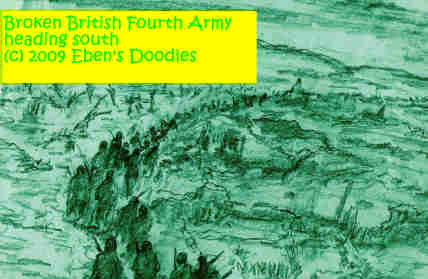
At the sight of old Rouen, Woodbine Willie, despite the feeling that this
depression was deepening, was vastly relieved. Perhaps he
could take the serjeant's advice, drink a mug of some hot milk with Scotch whiskey in it and
forget the whole bloody war! At least for a few hours. Maybe even when
he awoke he would discover it was all a bad dream."
But it didn't work. He awoke under a cloud of gloom, depressed, and ordered
a bottle of wine, as whiskey was much too strong on his nervous condition, then another bottle. The next day and the day after
passed in a blur.
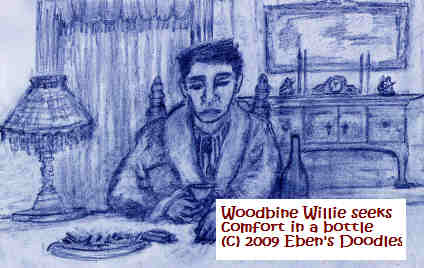
Should he just pack up and return home to Worcester? After throwing his
cross away, could he return to his post as vicar? Hadn't he thrown away his faith
in God too? He felt he had--since God was in command, or was supposed to be,
lord of heaven and earth, and so how could God permit such an atrocity as
this war? It was unthinkable that a God of mercy and justice could--
unless there was no such God in heaven, and he was very much inclined to
accept that now!
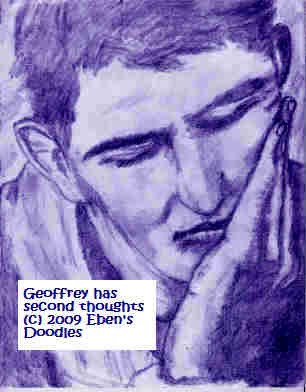
As he sank into even darker depths, at the thought of being
an apostate, without the slightest hope of resurrection and salvation and
a place ultimately in heaven with the saints of God, he ordered absinthe from
the landlady, and Madame Leblanc brought it, though she
was eyeing him carefully now.
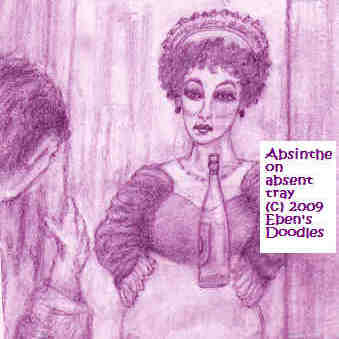
After his first bottle, he ordered a second, and when it came, he
experienced his first jolting hallucination, something for which absinthe was
famous.
No hands, and no tray either! It turned his stomach, and he couldn't touch
the absinthe for fear his own hands would vanish. Madame Leblanc stood, scrutinizing him as he hung to the door for support, fighting dizziness and the sight of
the nightmarish dismemberment of Madame Leblanc which reminded him so acutely of
what he had just seen out in no-man's land.
Finally, she spoke in her quite tolerable English. "You do not wish the absinthe, Monsieur? I think not it is so good
for you. Please get rest and not drink so much, oui? You are feeling ill? I could call the doctor I know who took care of my mother when she die. He would
know how to help you. You really do not look your old self, Monsieur."
But it didn't work. He awoke under a cloud of gloom, depressed, and ordered a bottle of wine, as whiskey was much too strong on his nervous condition, then another bottle. The next day and the day after passed in a blur.

Should he just pack up and return home to Worcester? After throwing his cross away, could he return to his post as vicar? Hadn't he thrown away his faith in God too? He felt he had--since God was in command, or was supposed to be, lord of heaven and earth, and so how could God permit such an atrocity as this war? It was unthinkable that a God of mercy and justice could-- unless there was no such God in heaven, and he was very much inclined to accept that now!

As he sank into even darker depths, at the thought of being an apostate, without the slightest hope of resurrection and salvation and a place ultimately in heaven with the saints of God, he ordered absinthe from the landlady, and Madame Leblanc brought it, though she was eyeing him carefully now.

After his first bottle, he ordered a second, and when it came, he experienced his first jolting hallucination, something for which absinthe was famous. No hands, and no tray either! It turned his stomach, and he couldn't touch the absinthe for fear his own hands would vanish. Madame Leblanc stood, scrutinizing him as he hung to the door for support, fighting dizziness and the sight of the nightmarish dismemberment of Madame Leblanc which reminded him so acutely of what he had just seen out in no-man's land.
Finally, she spoke in her quite tolerable English. "You do not wish the absinthe, Monsieur? I think not it is so good for you. Please get rest and not drink so much, oui? You are feeling ill? I could call the doctor I know who took care of my mother when she die. He would know how to help you. You really do not look your old self, Monsieur."
The next thing he saw was that Madame Leblanc's nose moved off her face and glued itself to the neck of the floating bottle, and together they moved round in a slow circle in a sort of dance, then starting toward him. Backing up in horror, he stumbled, and everything went black.
The next conscious thing he was aware of was that he was looking up into the nostrils of a huge whiskery gentleman.
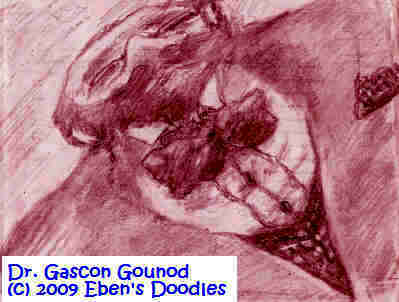
"I see you are coming round, Monsieur! But I want you to stop drinking so much, and no more absinthe! It curdles the brain! Stop killing yourself. Go and walk in the outdoors, get some fresh air! I can do nothing for you that good sense will not do, young man! You have your whole life ahead of you. Madame tells me you have kept to this room for days, and are doing nothing good for yourself--and so you see what a state you are in! Well, you can change that! You must! This is not the way for a man to live."
The doctor turned to Madame Leblanc as he was moving toward the door. She brought his hat, cane, and cloak. As he got ready to go out, he turned back to his patient. "I counseled you like a father, not only a doctor. Take my counsel! It is for your own good. Do not punish yourself so, for you are young, things will change. I do not know why you were doing this to your body, but I can tell you--whatever it is, a lost lover, a business collapse, some other great disappointment in your life--it is not worth destroying your life. Live! Live! You see things change, if only you will carry on. No adieu!
The doctor tipped his tall, beaverskin hat to the landlady, told her there would be no charge, and she showed him out, bowing her head as he stepped with dignity out of the room.
Madame Leblanc stood at the doorway and gazed back at chaplains.
"What will you do now, Monsieur? What will you decide? I was most concerned for you these last days. Please give heed to the good doctor. He is a fine gentleman, oui?"
Woodbine Willie stared at her with bleary eyes, and then laid his head back on the pillow of the bed where someone had carried him. He closed his eyes, and Madame Leblanc sighed, then quietly closed the door.
Coming episodes:
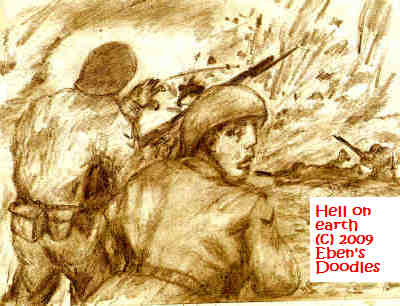
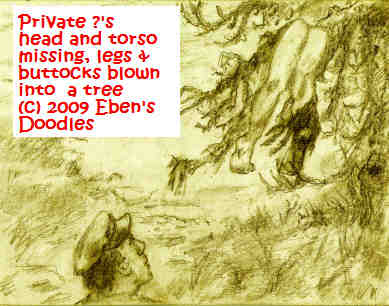
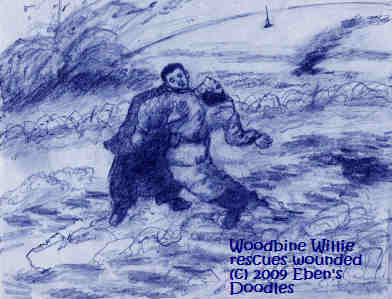
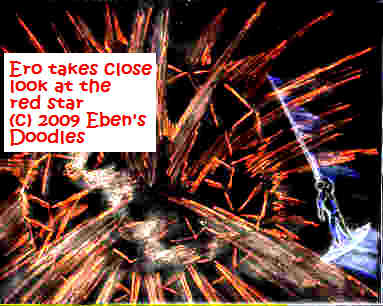
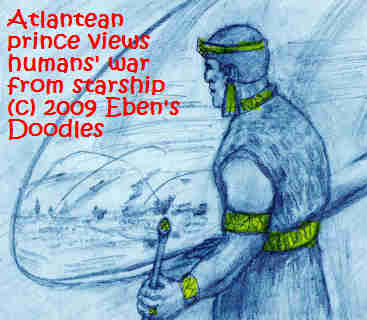

In the darkness, death, and despair that hung over the greatest wound on the planet, where whole nations were bleeding to death, a single greater light began to shine. Already millions of British and French, nearly a whole generation of young men in each nation, were slain, and millions more drawn from old age and boyhood years faced the same fate in the coming weeks, but shone like a star, and it was a star, the Nativity Star of Christmas Eve. Only that star could drive back the Red Star and penetrate the turbulent, fear-haunted morasses of mile upon mile of trenches and no-man's land, fortresses and bunkers with its light and reach the hearts of the combatants, German, British, French, and Austrian.
Nothing like it had ever happened before, for soon German troops at their side of the Front began singing Christmas carols, and the Brits and French across the shell-cratered, barbwired strip of no-man's land that separated the two armies responded with Christmas carols, joining the Germans in the celebration. The guns stopped firing. Men began to get up out of the trenches, and the bravest, still singing, began to move forward, without their guns. Slowly, they approached each other, and then the miracle of this first Christmas Eve on the Western Front: men who were committed to killing each other clasped hands and smiled and laughed, wishing each other Merry Christmas in their respective languages.
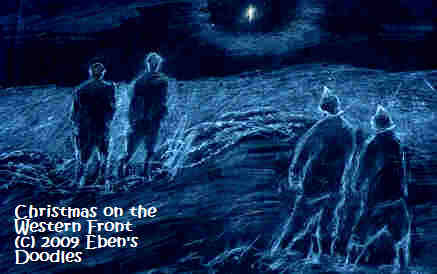

How much of you is Larry Prufrockski? The Larry Prufrockskis of the world are everywhere, operating high and low in human society. If they have their way (and it seems they soon shall), humankind would be gnawing the gristle off mammoth bones in a dark cave somewhere and sometime in the New Ice Age. This is the fate that is now yawning, promising to engulf all humanity once again, as the world slips back into nothing but ice, ice, ice.
Unchronicle, The Man Who Never Launched, Unchronicle of the Unfurled Sail, The Unquest of Larry Prufrockski, Vol. IV, Retrostar

CONCLUDING PORTION OF LARRY PRUFROCKSKI'S UNQUEST, "THE MAN WHO NEVER LAUNCHED":

Closest to the action, The City of London's Lord Mayor had a most elegant and exclusive party going on right up to the moment of the disaster, with the decks of his yacht, Planet Animal, crowded with the cream of international society. The King of Pop's ardent animal activism was being celebrated, in connection with his album. Whoever was anybody in environmentalism, animal rights, and the world faith movement would not have missed the King of Pop's own personal appearance--which was to occur at his own selected time, for as many minutes as he could suffer rubbing his sequined elbows with mere mortals, even if they were avid fans. So while they awaited the King of Pop's arrival by either special helicopter designed to look like the King of Pop's pet iguana, Elizabeth, so that the cocktail-sipping guests could enjoy the best view of the various dance teams onboard the barge, the Lord Mayor's yacht was drawn up as close as possible on the starboard side. Here they enjoyed a ringside view while the technicolor Image was towed upriver from a private drydock where it had been assembled under high security, with no press permitted on the premises, and towed up the Thames toward the city's landmark bridges.
The light show was incredibly staged, with colors progammed and coordinated to change every few seconds.

Larry had the best view of all, of course, except that his reflexes took over, he put his legs and feet up, shut his eyes, covered his head with his arms and prepared for the worst.

Here at the Tower Bridge the mishap occurred. An unexplained fatal convergence with a flying object, said to resemble an outmoded 1960s-era rocket, abruptly terminated the whole wonderful show. The Image's head, or the major portion of it, along with some of the torso emblazoned with the King of Pop's signature lizard and twin, ancilliary, peace signs, so happened to descend. That put an immediate end to the party, of course, and its various fund-raising programs for "Planet Animal," the movement to return Earth to the animals and eradicate humankind (or at least restrict humans to a limited number of fenced reservations set with population caps and publicly funded, univerally mandated abortion). Fifty of the guests were unaccounted for later after quite a few hours of frantic searching by authorities and diving teams with search lights after the yacht capsized and everything and everyone was dumped unceremoniously overboard into the turbid Thames.
The rocket seemed to have a thing for smashing icons, and the King of Pop's alter ego proved no exception. Maybe if there had been more time, and if the cockpit hadn't been in such shambles after the Eiffel Tower bust-up, the outcome might have been far different. With Larry no longer able to maneuver the rocket, the fatal convergence occurred despite his best efforts. The King of Pop's cork was popped.

The rocket sliced through the Pop King like cheese, and it instantly became fragments, flying in every direction. Then Larry's next impression was that the rocket had become a giant water ski or hydroplane, its engines continuing to thrust, which raised the cabin skywards as the main fusilage plowed through the water, making a giant wave that easily washed up over the Thames embankments, dousing thousand of on-lookers befor they could flee. In this position, the rocket reached the next bridge and slid right over it, suffering little damage, and the engines continued to function. It was like a hurdler jumping each hurdle, only the ground, in this case the river water, was helping him by pushing upwards at the same time. The moment the rocket fell back to the water, the thrust from the engines pushed it onward at a rapid speed, and when the low arched London Bridge converged with the rocket, it washed up and over, sweeping a tsunami-like wave ahead of it as a lubricant.

Four historic mid-town bridges spanned the Thames in this section of the river, and Larry clung to his seat and had no idea what was happening as he rode the bucking, hydroplaning rocket.
He only sensed a tremendous surge beneath of the water whenever the rocket hurdled a bridge, scraping off some of his hull, but losing nothing essential to the engine and on-board nuclear plant.
After leap-frogging the fourth bridge, the Thames took a turn toward the Parliament Houses of Westminster. At that time the BBC had all its chief commentators assigned and embedded in the main event: to all appearances, the Gothic vaulted House of Commons chamber was crammed with M.P.s for an important speech by the Prime Minister. This upcoming speech had already for days been the leading topic in the press, because all the talking heads had were agreed it would mark the apogee of the PM's career as a leading exponent of Climate Change and reduction of carbon "greenhouse gases". Many thought he might even win the Nobel Peace Prize for it, and said so in their articles in the Times, but his press secretary reported that the Secretary thought it should go to greater men posthumously, such as Lenin, Stalin, and Mao, rather than himself.
He was reaching a rather soaring point in his loudly applauded speech detailing the heroic sacrifices required from the British people to save the Planet with drastically reduced carbon emissions (thermostats turned down to fifty six, virtually no private cars, far less bathing, thousands of factories and businesses closed either closed or barely running due to failure to secure adequate carbon credits, essential hospital services and medicines cut back, rationing of oxygen to patients with respiratory problems, shutdown of all mines, refineries, coal-fired electric plants...) when Larry's flying bomb displaced the roof and ceiling.
You would have thought Larry's unannounced intrusion would have provided a most spectacular climax to the Prime Minister's concluding words: "Know that I indeed feel your momentary pain and discomfort, my fellow citizens of the world! Yet what little we give up, we gain immeasurably thereby, for after our sacrifices we can look forward to climbing together, hand in hand, entering the broad uplands of human progress and happiness, whilst being strengthened with the full assurance that this frail barque, Planet Earth,with its human, animal, and vegetable burden, will continue to fly for many years to come."
The applause was deafening. It was a magnificent speech. Yet the moment before Larry erupted so rudely upon the scene there was nobody there, the entire edifice was completely vacant.

Instead, the venue proved to be a private and discreetly government-run BBC studio that staged the entire event, utilizing computer imagery to simulate the m.p's and their ecstatic responses to the Prime Minister's speech. Tony Blair? Disraeli? Edmund Burke? Cicero? Golden Mouthed Demosthenes? They were quite at a loss to find comparisons to do the P.M. justice!
Larry was in the catbird's seat where he was riding the nuclear space rocket, able to see everything, as the rocket turned at the Westminster Bridge and veered sharply toward the Houses of Parliament.


As soon as the Prime Minister could be reached at a posh, security-fenced villa in the south of Spain and informed what took place at the actual House of Commons, not the virtual one in which he had just performed so brilliantly, the news was suppressed, and the House was taped off from the public and guards in all-white radiation/chemical gear posted, with only the explanation that it was closed for routine maintenance, though everyone who could get close enough could see it was a ruined shell, looking once again much the same as when it had been bombed in World War II, except with the difference it glowed at night.

The 22nd Century, the Crystal Age, just before the final crack-up of the infrastructure due to the Greek pandemic, a hitech, nano-cultured disease that attacked the latest state of the art technology and architecture:

In the 23rd Century, Olson and Hodgkins, aboard the Atlantis II dirigible flying from Holland America to the Holy Land, with a stop-off at London, at one point could look straight down at the Bank of England, the treasure chest that held most of the world's gold reserves even while most of the Northern Hemisphere was sinking rapidly back into the Stone Age due to Global Cooling.

For Chronicle Sixty-Two's Unchronicle I, in which Ero flies the Wally-programmed copper dome of the City of Destiny's old Union Train Station to 19th century Chicago just as the Uproarious Hog Butcher of the World erupts in the Great Chicago Fire, and next to the 21st century's dramatic debut with Puppet Master Osama bin Ladin's Muslim terrorists wreaking destruction on the World Trade Center, then a direct hit on the Pentagon, followed by a near take out of the White House, go to Unchronicle I.
CHRONICLE SIXTY-TWO, ANNO STELLAE 10,999, QUEST OF THE CYBERNAUTS
UNCHRONICLE I, CHRONICLE SIXTY-TWO, VOL. III, RETROSTAR

UNCHRONICLE II, PART I, THE CHRISTMAS PRODIGAL; PART II, THE HOUNDS AND THE BLACK PANTHER, PART III, THE KNIGHTS OF THE AXES OF HONOR, CHRONICLE SIXTY-TWO, VOL. III, RETROSTAR
Unchronicle II, Part I, The Christmas Prodigal, CHRONICLE SIXTY-TWO, RETROSTAR

Unchronicle II, The Hounds and the Black Panther, CHRONICLE SIXTY-TWO, VOL. III, RETROSTAR
Unchronicle II, The Knights of the Axes of Honor


What was this Bridge? Why did it mean so much to Yeshua? They soon saw it, for the bridge appeared in sight, as they were instantly transported to Orion the Hunter.

How beautiful! There was nothing else like it in the entire Universe. It was blue, it was crystal, and was strung across the shining depths of Orion, in the mouth of the Great Nebula. But what was its significance, meaning, and purpose? They would have to wait a bit more before they could find out. At any rate, they knew their purpose: defending it against any assailants.
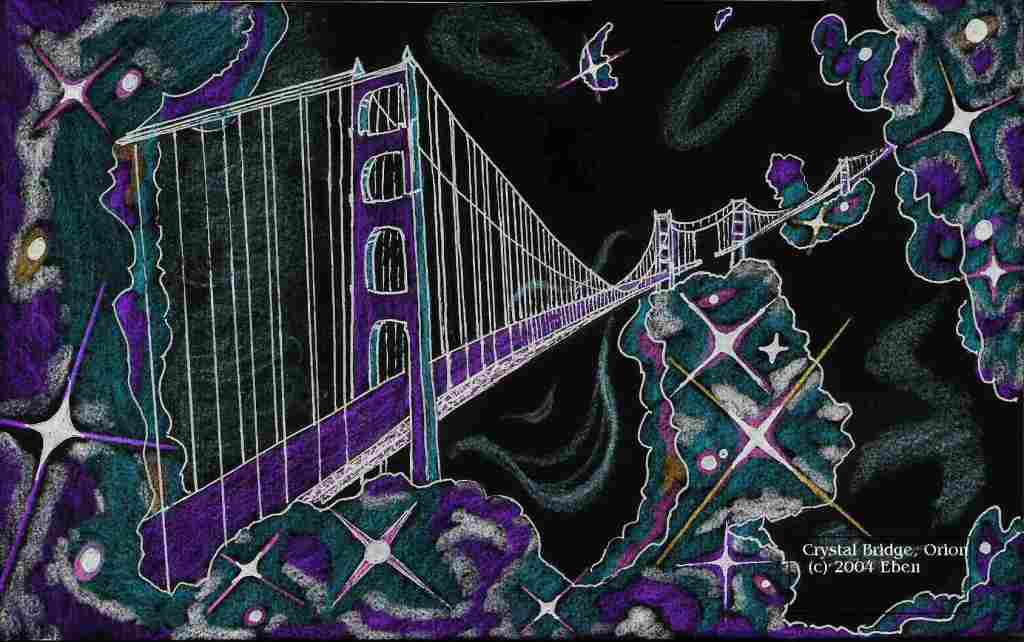
The Knights, closer in, saw the gap in the Crystal Bridge for the first time. What had caused that? How could it be mended? They would soon learn what Yeshua had described to them, as each Reconciler, each Champion of some special kind appeared to take his or her place on either side of the breech, in preparation for the final repair and the drawing together of the severed halves.



Star and Twin Worlds Timelines
Brief Account of the Twin Earths
Bridges of Destiny
Star Map of the Re-Located Earth, Twin Earth Atlas, Stellar and Terrestrial
Argo, Ships of the Line
Volume IV, Appendix, Part I
Volume IV, Appendix, Part II
On both Earths, diminutive Holland has always prospered like a scarlet rock rose on a hard place. Where her predecessors and contemporaries gave up in despair, she reaps bountifully where others cannot scratch a bare subsistence living. Hollanders developed their expertise in turning adversity to prosperity and learned how by first cultivating their wretched patches of high-sodium tidal flats in northern Europe to produce the best creameries and flower businesses in the world--and continued to thrive on up to the collapse of the World Government of Chillingsworth's in the 22nd Century of Earth II. But the deepening New Ice Age tested the mettle of the Dutch in America beyond even their supreme ability to cope, and slowly, inch by inch, they were forced south, though they did not give up willingly and fought like savages for every blessed Dutch inch.
Map of Holland America
Extraterrestrials and Terrestrials
The Algol Invasion & Client Species

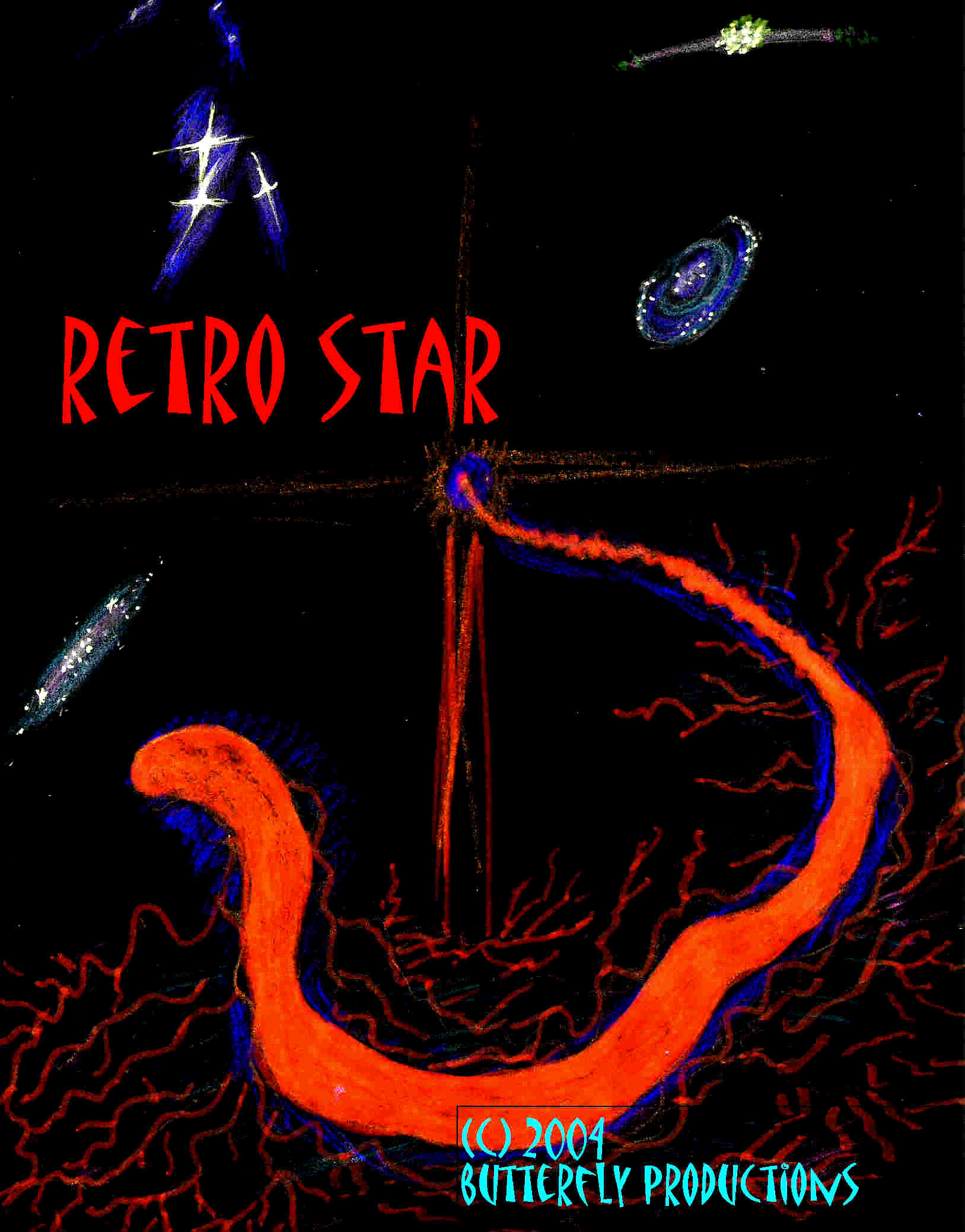
The Star-Stones, the Evil, Scheming, Destroying Jewels of Fire, & Other Fatal Jems:
Universe Terminator: The Sardius, or Carnelian, Red Star, Stone of Fire, Fiery Stone, the First Alien Entity, Wormwood, Wormstar, Retrostar
Curses attached to certain diamonds and other precious jems--are they fiction or real? The late Vera Boch beautifully illustrated the malevolence and deadliness that lurked in the most alluring and costly jewels:




The Topaz
The Black Crystal and the White Ship


Everything has a time and season. This time is the Nativity of Yeshua the Christ, the celebration thereof, and the season is, gasp, Christmas. Yes, C-H-R-I-S-T-M-A-S, which next to, double gasp, "J-E-S-U-S" is the most politically incorrect and forbidden term in secularist, liberal, leftist society! How in the world, asks Eben, did we ever regress to a state in this benighted country where now you can't even mention Jesus and Christmas in public? Or have a sweet, little Nativity Scene in a public place--a courthouse yard, or a public school, or an airport, without the tusk-toothed, hemorrhoidal Scrooges and Grinches of the Left going into high gear with their lawyers to smash them to pieces? This is not America. America, the land of the free and the home of the brave, has been murdered while it slept. This rotting, stinking corpse that remains is a prison of fools and cowards ruled over by oppressors who masquerade as society's watchdogs of civil liberties. Well, no matter how bad it's become, there is still an alterative. It is called Sanity. In that wondrous, lost world which we can still regain by choice, at least individually if not societally, you find such things as innocence, charm, love, mutual understanding, peace, joy, truth, and mercy. Without sanity, there can be no such things. And Eben has a key he wants to give to anyone who wishes to re-enter that lost world. It is the golden key of hope--true, real hope, not the false kind offered by charlatans. Hope for a better day, hope for a better life, hope for true fulfilment, hope for more of Yeshua and His grace, produces such things as these, two poetic slices of his heart that Eben offers to you now at this time (the glorious Nativity of Yeshua being celebrated by all those who are true in heart) and season (Christmas which turns the most dreary days of the year into shining joy and happiness and beautiful, undeserved, surprising delights). But there is more: forgiveness, reconciliation, reunion of severed hearts and lives.
"Ballad of a Victorian Christmas," by Eben
"A Fawn in Winter," Ballad of a Christmas Card, by Eben

